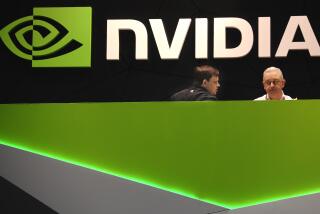Microsoft Looks to Reassure Investors
- Share via
REDMOND, Wash. — With a dearth of major new products set for release in the coming year, Microsoft Corp. executives Thursday encouraged investors and analysts to take a longer and wider view of the company’s prospects.
In the face of Wall Street’s concern that the company’s best days are behind it, Microsoft Chairman Bill Gates and others portrayed a $37-billion powerhouse that is growing in more areas than before and is poised to benefit -- sooner or later -- from the increasing adoption of high-speed Internet access and wireless technologies and from increasing demands for data.
“Entertainment will be a focal point, along with communication and productivity,” Gates told more than 300 finance professionals at a daylong meeting at the company’s headquarters here. “We are the only company that has all three of those legs.”
The annual gathering came at a pivotal time for the world’s largest software company.
Last week, Microsoft declared a special dividend that would return $32 billion in cash to shareholders. Two days later it trimmed profit projections for the fiscal year just begun, sending its already stalled shares lower. On Thursday, Microsoft shares slid 10 cents to $28.48 on Nasdaq.
The reduced estimates deepened investor concern that Microsoft had already experienced its greatest growth years. That added to worries about competition from the free Linux operating system and the recent disclosure that Microsoft had considered spending tens of billions of dollars to acquire SAP, the leader in management software for big businesses.
But Microsoft executives gave upbeat presentations Thursday, and Chief Executive Steve Ballmer said annual operating profit could grow by $4 billion to $6 billion by the end of the decade:
“We might be able to grow a whole Nokia, a whole Siemens, or maybe even a whole Intel,” he said.
Gates said the company had something of an insurance policy in its broad portfolio of patents. The company applied for about 2,000 patents in the fiscal year ended June 30 and expected to seek about 3,000 more in the current year, which could produce a new revenue stream, he said.
“It is something that’s in an early stage, but it’s something we’re pretty excited about,” Gates said.
A significant push for patent licenses would be a major shift in strategy, one that risks reviving antitrust claims against the company.
It would also echo a move made by rival IBM Corp. when its growth slowed. A perennial leader in new patents, IBM buttressed its 2003 profit with $338 million in licensing income.
In a lunchtime conversation with a cluster of analysts, Gates said a major patent-licensing effort could be seen as a failure, since his first choice would be to sell products.
“It’s too soon to predict a new revenue stream,” said Morgan Stanley analyst Mary Meeker, a Microsoft shareholder who spoke with Gates. “But he kind of lit up about it.”
In his formal remarks, Gates said other grounds for optimism include the spread of entertainment-oriented computers in living rooms and rapid improvements in cellular phones.
The coming year won’t feature major enhancements from the two largest Microsoft divisions -- those that make the dominant Windows operating system for personal computers and the omnipresent Office suite of productivity programs. But MSN just had its first annual operating profit on sales of $2.2 billion.
“They are brilliantly repositioning this company as growth at a reasonable price,” said Internet analyst John Tinker of ThinkEquity Partners.
Although Microsoft’s overall revenue growth this year will slow to its lowest rate, several analysts said the company would rebound with the release of Longhorn, the next major version of Windows, due out no sooner than 2006.






